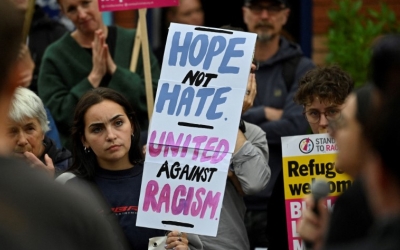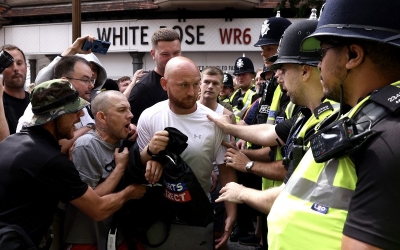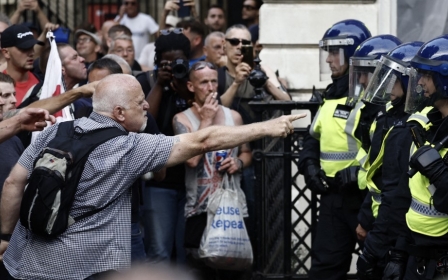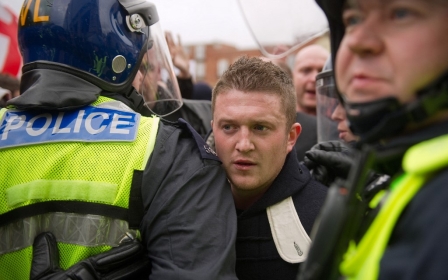UK riots: The fascist threat is resurgent. Here's how to stop it
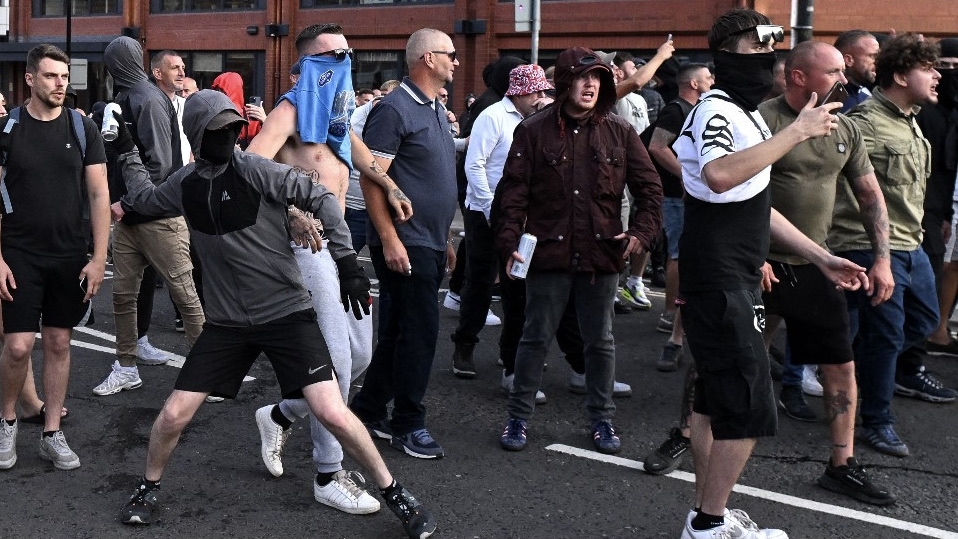
The flash riots organised by the far-right in Southport, central London and other places, preceded days earlier by the largest-ever Tommy Robinson rally in Trafalgar Square, have raised the threat of a resurgent fascism in the UK.
These events themselves were all immediately preceded by the election of five Reform UK MPs, headed by Nigel Farage, in the 4 July general election. And all this is taking place in the wider context of far-right advances in Italy, Germany and France, despite the check delivered to Marine Le Pen’s party by the New Popular Front in recent French parliamentary elections.
All this has sparked a new discussion about the nature of modern fascism. Much of the media resists describing the current political formations as fascist, noting the ways they differ from German Nazism, for instance, and prefers to describe them as "far-right" or "populist right".
We can get a better understanding of what the current threat of the resurgent right is if we take this debate seriously.
Fascism requires three conditions to be met to reach its fully developed form, which is not to say it cannot wreak havoc in less developed forms. These requirements include an effective paramilitary force capable of defeating its domestic enemies; a degree of parliamentary legitimacy and leverage; and the backing of at least a significant section of the ruling classes.
New MEE newsletter: Jerusalem Dispatch
Sign up to get the latest insights and analysis on Israel-Palestine, alongside Turkey Unpacked and other MEE newsletters
The less problematic use of the term fascist is when it is used to describe Tommy Robinson’s supporters.
These street thugs, while not a paramilitary force, most nearly approximate how popular imagination sees fascists. And it is certainly true that the one key component, indeed a defining component, of fascism is an ability to physically drive its opponents off the streets, to intimidate and disable the left and the wider workers' movement using physical intimidation.
Ideologically malleable
Robinson’s supporters are currently a long way from untrammelled control of the streets. But Robinson, whose real name is Stephen Yaxley-Lennon, has long had such ambitions, stretching back at least to his previously most successful project, the now long-defunct English Defence League.
But the lineage stretches back long before Robinson to the British National Party (BNP) in the early 1990s, the National Front in the 1970s, and Oswald Mosley’s British Union of Fascists in the 1930s.
Some of the immediate targets of the fascists have changed, of course. Modern fascism does not make antisemitism a defining characteristic.
As far back as its BNP incarnation, fascism in the UK has concentrated on Islamophobic rhetoric and actions. This was in response to the renewed Islamophobic turn in establishment ideology after the Gulf War. The fascists were concerned about cutting with the grain of the dominant ideology, and so the primary target group was identified as Muslims, not Jews.
Robinson and many other 21st-century fascists have taken this a step further and adopted Zionism as a constituent part of their ideology, and are now in an open alliance with some Zionists against the Palestine solidarity movement. Robinson has said that "Jewish people are persecuted [by Muslims] and no one speaks out for them".
Indeed, historically, fascism has always had this ideological malleability. Italian fascism under Benito Mussolini never needed to make antisemitism as central to its worldview as it was to Adolf Hitler’s Nazism.
Equally, it is no barrier to Robinson’s hatred of Muslims to include Black and gay speakers at his recent Trafalgar Square rally.
No matter how insincere or instrumental such performative actions may be, they serve to give modern fascism some distance from its 1930s antecedents while retaining a core hatred that bleeds over from mainstream prejudice into fascism.
Reform UK's central role
These, then, are the characteristic forms of the current attempt to build a street-fighting force on the political right.
But the development of street politics is only one, however vital, aspect of fascism. Fascism has always had a parliamentary dimension, notwithstanding its ultimate aim of crushing all democratic rights.
Reform UK is an important part of this picture. Not formally allied to or an advocate of a paramilitary force, Reform UK is nevertheless developing a relationship with Robinson’s supporters.
The tens of thousands at Robinson’s Trafalgar Square rally, when asked from the stage by Robinson himself who they had voted for, overwhelmingly identified themselves as Farage voters.
Farage made a televised broadcast for social media in response to the Southport riot in which, after a brief pro-forma passage distancing himself from the attack on the mosque, he then went on to fully identify himself with the "concerns" of the rioters.
These two elements of an effective fascist movement have not yet fully coalesced, but they stand in close enough political proximity to be actively encouraging each other already.
The third element that has always been necessary to make fascism into a truly existential threat to the working class movement and to democratic rights has been a willingness by at least a significant section of the ruling class proper to endorse such a dramatic and dangerous course. There would have been no Chancellor Hitler without President Hindenburg.
We are some distance from this condition being realised in the UK, where the ruling class is currently endorsing Keir Starmer’s alternative to deracinated Toryism.
But the very uprooted Toryism that Boris Johnson introduced to his party through the Brexit internal coup has unleashed a leadership that is much closer to the far right than ever before.
Suella Braverman was, after all, responsible for the first revival of Robinson when she summoned the far right onto the streets last Armistice Day to confront Palestinian protesters (and the "two-tier policing" that she claimed was protecting them).
That gamble failed and cost Braverman her job and the credibility to stay in the current Tory leadership race. But none of the remaining candidates are from the liberal wing of the Tory party. Indeed, they are all politically indistinguishable from Braverman.
Battle lines
Thus the Tory party in opposition will stand closer to Farage, who some Tories think should be their leader, and through Farage to Robinson, than any Tory leader ever.
Thus the constituent parts of a wholly more threatening version of fascism are to be found adjacent to each other in UK politics. They have not yet assembled, but they are in formation.
To prevent them from strengthening one another, let alone coalescing in a single organisational political project, the labour movement and the left will have to act decisively.
Firstly, they must offer unconditional solidarity with the Muslim community, not only because it is the community most obviously targeted by Robinson, Farage, the Tories and the state, but because through successive waves of politicisation since the Iraq war, it is highly receptive to political projects that offer joint resistance with the overlapping working-class movement.
Anti-imperialist politics are a vital element of anti-fascism, not least because the Robinson-Zionist alliance has made this issue central to its ability to mobilise
Secondly, anti-imperialist politics are a vital element of anti-fascism, not least because the Robinson-Zionist alliance has made this issue central to its ability to mobilise.
Thirdly, the left has to present an alternative to Broken Britain.
The greatest danger in the not-so-long term is that the Starmer government fails, as all its predecessors have done, to reverse the profit-before-people culture that has torn a hole in every working-class community in this country.
It is ultimately from the desperation that this condition produces that fascism and the far right grow.
One more turn of this screw may be the tipping point that produces a wholly new order of threat from the right.
These are the battle lines. It's time to act, before the fascist threat becomes fully formed.
The views expressed in this article belong to the author and do not necessarily reflect the editorial policy of Middle East Eye.
Middle East Eye delivers independent and unrivalled coverage and analysis of the Middle East, North Africa and beyond. To learn more about republishing this content and the associated fees, please fill out this form. More about MEE can be found here.



